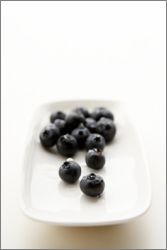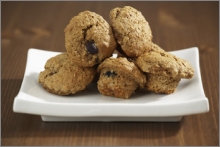Colon Cancer:
Natural Tips to Lower Your Risk of This Common Cancer
by www.SixWise.com
There are about 150,000 new cases of colon cancer each year in the United States. Colon cancer is cancer of the inner lining of the colon. The colon makes up about 5 feet of the large intestine, connecting to about 6 inches of rectum.
|

Eating more vegetables and fruits, including blueberries, may lower your risk of colon cancer.
|
Colon cancer, colorectal cancer, and rectal cancer are all pretty much the same disease -- colorectal and rectal cancers affect the area of the colon that is closest to the rectum. The American Cancer Society states that poor dietary habits, obesity, and inactivity will be responsible for at least 1/3 of all cancer deaths this year.
Because colon cancer occurs in part of the digestive tract, what you decide to eat has a lot to do with your risk factor for this disease. With that in mind, here are some top tips to lower your risk.
1. Maintain a Healthy Lifestyle
Diets low in fruits, vegetables, and whole grains and high in red and processed meats, trans-fats, sugar, and processed foods high in preservatives (i.e. cancer-causing nitrites and nitrosamines), increase the risk of colon cancer.
Chemicals found in cigarettes and the charred areas of charred or char-broiled meats contribute to the growth of colon polyps and tumors. The good news is that making positive lifestyle choices, such as quitting smoking, limiting alcohol intake (alcohol use can damage DNA, causing abnormal cellular replication which is a precursor to cancer), increasing activity -- exercising for 30 minutes 3-5 times a week -- and eating a healthy diet (including 5-9 servings of vegetables and fruit a day) will help to reduce your risk of not only colon cancer, but all cancers as well as other health problems.
In terms of diet, make sure to choose healthy fats, such as omega-3 fatty acids found in salmon, tuna, fish oil, flax seed, and walnuts. Make sure to limit shortening, margarine, and other foods containing partially hydrogenated oils -- these are found in a number of processed foods. Replace fried foods with baked, steamed, grilled, or broiled foods instead.
|
Wash Dem Veggies!
Safely remove toxic pesticides, dirt, mold and other residues from your family's produce with Vermont Soap Organics' Wash dem Veggies. This unique fruit and vegetable wash:
- Makes foods taste better
- All Organic-Soap based
- All-natural ingredients
- Healthy, non-toxic alternative
- Absolutely NO artificial colors, fragrances and preservatives
- Available in 16oz or Economical Gallon Size
- No Animal Testing
- No Animal Products or By-Products
|
When it comes to fruits and vegetables, make sure to wash and scrub all produce under running water, peel produce or remove the outer leaves when possible, and buy organically grown produce as much as possible to reduce your risk of cancer-causing pesticide consumption.
An excellent product that will help to remove pesticides from your produce better than water alone is Vermont Soap Organics' Wash dem Veggies. This fruit and veggie wash naturally eliminates the pesticides, dirt, mold and other residues found in so many of today's fruits and vegetables.
2. Colon Cancer Screening
The longer cancer goes untreated, the higher the risk of mortality. Early detection is key. For men and women over 50, there are a number of tests used to screen for colorectal cancer. A barium enema, sigmoidoscopy, or colonoscopy, used in conjunction with a digital rectal exam (DRE), have been shown to detect early cancer and polyps. The Fecal Occult Blood Test (FOBT) as well as the Fecal Immunochemical Test (FIT) should be used yearly to test for early cancer (not polyps, which could turn into cancer).
The FOBT and the FIT are take-home multiple sample methods. The colonoscopy and sigmoidoscopy employ a long, small, flexible tube with a video camera attached to examine the large colon. The colonoscopy is recommended every 10 years, the sigmoidoscopy (investigates a smaller area of the colon than the colonoscopy) every 5 years.
|

A diet rich in fiber-filled foods has been shown to reduce cancer risk, but a debate is going on as to whether fiber specifically lowers the risk of colon cancer or not.
|
Tests should begin after the age of 50, according to a study done by Francis M. Giardiello, MD, of The John Hopkins University. Talk to your doctor about which test(s) are right for you.
3. Vitamin Supplements and Foods
Certain foods, vitamins, and herbs have also been shown to lower the risk of colon cancer:
- Folate
- Folic Acid
-
Folic acid is the synthetic form of folate found in supplements or added to fortified foods. People with ulcerative colitis (UC) have an increased risk of developing colon cancer. A number of people with UC take the folic-acid-depleting drug sulfasalazine. Some research shows that people with UC who took at least 400 mcg per day of folic acid were 62% less likely to develop colon cancer. Just like folate, folic acid has also been shown to reverse damage to DNA, such as caused by alcohol use. Because damaged DNA can ultimately contribute to cancer, reversing those effects can help to reduce cancer.
- Selenium
-
Low levels of selenium in the blood have been found in patients with a number of different cancers, colon cancer included. One particular study that treated patients with 200 mcg of yeast-based selenium per day for 4 years showed a 50% decrease in overall cancer death, with a 58% decrease in incidence of colon cancer.
- Calcium
- Conjugated Linoleic Acid (CLA)
- Vitamin C
- Vitamin E
- Vitamin D
- Fish oil
- IP-6
-
IP-6, also known as inositol hexaphosphate, phytate, or phytic acid, has proven anticancer qualities in animals, especially in colon cancer. A side effect of IP-6 is that it blocks the absorption of minerals. IP-6 can be found in a number of foods, such as oat bran, wheat bran, and flat (unleavened) bread.
- Fiber
-
Fiber can be taken as a supplement, or consumed as part of your diet. Although a diet high in fiber-filled foods, such as broccoli, whole grain products, and fruits has been shown to reduce overall cancer risk, there is a debate going on as to whether or not fiber specifically reduces the risk of colon cancer, as was previously thought.
- Aspirin
- Almonds
- Garlic, onions, leek, chives
- Blueberries
- Green tea
- At least 3 ounces a day of green tea can help to reduce the risk of several types of cancer, including colon cancer and breast cancer.
Make sure to check the individual supplement or herb for any side effects or interactions.
Recommended Reading
Does Your Breath Smell Like Cancer? 5 Incredible Forms of Early Cancer Detection
The 8 Most Unusual Sources of Potential Cancer Cures
Sources
Adams, Mike. Eating Blueberries Slashes Colon Cancer Risk by 57 Percent, Animal Study Finds. July 26, 2007
ColonCancerFoundation.org Colon Cancer Prevention. October 2008
MayoClinic.com Colon Cancer. October 2008
Office of Dietary Supplements. Dietary Supplement Fact Sheet: Folate. October, 2008
Prevention.com Colon Cancer, Natural Remedies, Vitamins That May Be Helpful. October, 2008
Sahelian, Ray, M.D. Colon Cancer. October, 2008
WashingtonPost.com Daily Aspirin May Reduce Colon Cancer Risk. May 11, 2007
WebMD.com Aspirin May Lower Cancer Risk. March 5, 2003